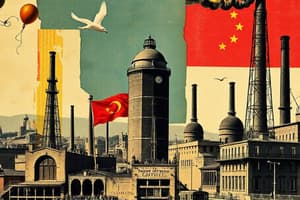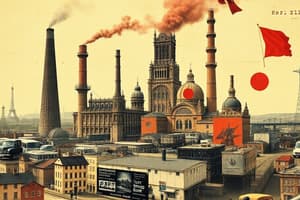Podcast
Questions and Answers
What was a significant consequence of the Industrial Revolution?
What was a significant consequence of the Industrial Revolution?
- Increase in agricultural practices
- Rise in factory-based work (correct)
- Decreased use of technology
- Reduction in child labor
Nationalism has never been used as a motivational tool for unification.
Nationalism has never been used as a motivational tool for unification.
False (B)
What significant construction helped shorten the sea route between Europe and India?
What significant construction helped shorten the sea route between Europe and India?
The Suez Canal
In a ___ economic system, there is no private ownership of resources.
In a ___ economic system, there is no private ownership of resources.
Match the following terms with their descriptions:
Match the following terms with their descriptions:
Flashcards
Industrial Revolution
Industrial Revolution
A period of significant technological advancements and a shift from agricultural to factory-based work, beginning in England and the US around 1750. It led to harsh working conditions, including child labor. Demand for goods influenced pricing.
Nationalism
Nationalism
A strong feeling of national pride and identity, often encouraging unity and expansion. It drove movements like the unification of Italy and Germany.
Imperialism
Imperialism
The use of industrial production and profits to expand empires and control resources. This resulted in the colonization of Africa and other regions.
Socialism
Socialism
Signup and view all the flashcards
Social Darwinism
Social Darwinism
Signup and view all the flashcards
Study Notes
Industrial Revolution
- Shifted from agricultural to factory-based work.
- Triggered by growth and technological advancements.
- Featured harsh living conditions, including child labor and women in factories.
- Originated in England and the US around 1750.
- Led to price fluctuations based on demand.
- Transformed perspectives on technology's societal role.
Nationalism
- Fosters national pride and identity.
- Emperor Meiji modernized Japan by establishing education systems.
- Giuseppe Garibaldi unified Italy.
- Otto von Bismarck utilized nationalism to motivate Prussia, uniting it with Germany through war and expansion.
Industrialism and Imperialism
- Industrial production fueled imperialism, generating profits and enabling empire expansion.
- Resources in Africa drove colonization efforts.
- The "White Man's Burden" justified imperialism.
- Social Darwinism explained dominance as related to strength.
- Imperialism led to exploitation and discrimination.
Transportation and Global Conflicts
- The Suez Canal shortened the sea route between Europe and India by 6,000 km.
- The Boxer Rebellion was an anti-foreigner uprising in China.
Economic Systems
- Communism: No private ownership.
- Capitalism: Private ownership of resources and businesses.
- Socialism: Collective ownership of businesses and resources.
Studying That Suits You
Use AI to generate personalized quizzes and flashcards to suit your learning preferences.




